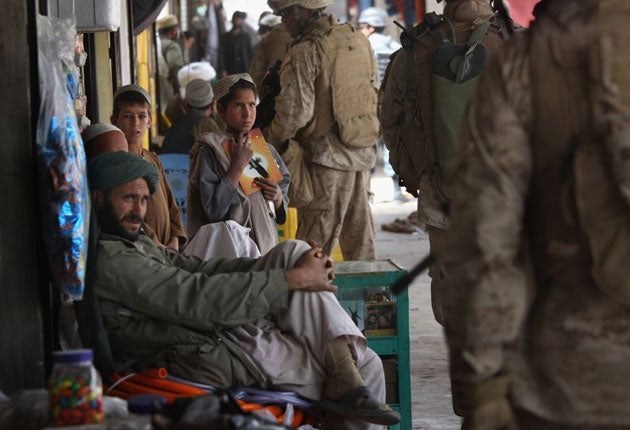Obama seeks $5bn aid for Pakistan to fight al-Qa'ida
Cash will be incentive to combat terrorist havens on Afghanistan's borders

President Barack Obama unveiled his new strategy for combating terrorist insurgents in Afghanistan and Pakistan yesterday while insisting he would not "blindly stay the course" if the governments of both countries failed to help secure peace.
Mr Obama will ask the US Congress to authorise an additional $1.5bn (£1bn) in development and construction aid to Pakistan each year for the next five years as an incentive to combat more convincingly the growing mesh of terrorist havens in the mountain regions close to Afghanistan.
While insisting that the situation in Afghanistan is "increasingly perilous", President Obama also made clear that he expects America's allies to remain committed if not with greater troop numbers then with aid and civilian assistance. The President confirmed that on top of the additional 17,000 US troops another contingent of 4,000 will be deployed as advisers and trainers to the Afghan army and police.
"We have a clear and focused goal to disrupt, dismantle and defeat al Qa'ida in Pakistan and Afghanistan, and to prevent their return to either country in the future," the President said, flanked by Secretary of State Hillary Clinton who will present the plan to an international conference on Afghanistan in The Hague on Tuesday.
He will win praise for vowing to set clear aid benchmarks that the governments of both Afghanistan and Pakistan will have to meet. Pakistan has long been held in some suspicion for taking American money while failing fully to tackle the Taliban and al-Qa'ida. Pakistan's ambassador to the US, Husain Haqqani, hailed the plan as "an extraordinarily positive sign that the Obama administration is thoroughly re-examining its policy toward our region." Mr Obama said that Nato forces, led by America, had no choice but to militarily defeat "an uncompromising core" of the Taliban. However, he hinted at reaching out to others who may identify themselves as Taliban but "who have taken up arms because of coercion, or simply for a price".
Talking to so-called "moderate" Taliban fighters was among the most divisive issues as aides to Mr Obama crafted the review. But Kabul welcomed America's new thinking as a "potentially game-changing event" last night. Officials insist the ideas outlined represent a landmark shift.
"If we compare where we were two years ago, this is a decisive change of direction," a senior Western diplomat said. "One of the things that has been lacking for some time has been a clear vision for the international engagement with Afghanistan," a European diplomat said. "One of the things this has done is simplify our objectives."
But it is evolution rather than revolution. "The most important thing about this announcement is that is comes straight from the White House. It shows the Americans are on the same page, they've taken these ideas on board," said one official. The importance of Pakistan has long been well known. Britain's General David Richards, who commanded the Nato-led International Security Force in 2006, held regular summits with Pakistan's then leader Pervez Musharraf. Similarly, talking to the Taliban is nothing new. Two Western diplomats were expelled from Afghanistan in 2007 for talking to the Taliban and the former UK ambassador, Sir Sherard Cowper Coles, was advocating greater tribal outreach two years ago.
"These ideas have been around for months," said John Dempsey, head of the United States Institute of Peace, in Kabul. "The significance of this announcement is that it elevates Afghanistan and Pakistan to the top level of American foreign policy."
The sense in Kabul is that America has around 18 months to deliver a "sense that the tide has turned". Western diplomats are acutely aware that "a large military presence is not sustainable over the long term" and that success relies on getting Afghanistan to a stage where its army and police can stand more or less alone.
Britain's most senior officer in Afghanistan, Lieutenant General Jim Dutton, said that the campaign was afflicted by a "perception issue". He added: "I don't think we have got the momentum." Analysts in Kabul believe that the combination of 17,000 extra American troops, the "civilian surge" and the planned elections in August offer the best shot at regaining that momentum.
Subscribe to Independent Premium to bookmark this article
Want to bookmark your favourite articles and stories to read or reference later? Start your Independent Premium subscription today.

Join our commenting forum
Join thought-provoking conversations, follow other Independent readers and see their replies